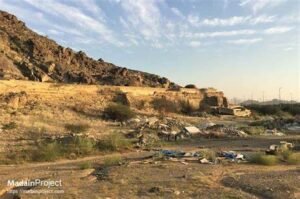On the outskirts of Mecca are the historic springs, a circuit of wells and water stations that have served the Hajj pilgrims for decades and continue to do so to this day. These springs are called the Zubaida springs, Darb Zubaidah. They ensured survival and convenience for countless travelers along the arduous Hajj route. But have you ever wondered about the remarkable individual after whom these springs are named?

Source: The Canal of Zubaida (Madain Project | Bing Images)
Introduction
In the early Islamic era, the Abbasid Caliphate was one of great influence. Among them, one woman rose to respect and recognition. Zubayda bint Abu Ja`far al-Mansur was the wife of Caliph Harun al-Rashid, the granddaughter of Caliph Al-Mansur, and also the mother of Caliph Muhammad Al-Amin. In terms of wealth and power, Allah had blessed her beyond measure. She used them to leave behind a legacy, one of generosity, philanthropy, and faith.
Early Life and Status
Zubayda was born into privilege, the daughter of the caliph who founded Baghdad, one of the greatest cities in Islamic history. Her upbringing was steeped in the culture and refinement of the Abbasid court. She grew up with a deep sense of responsibility and purpose. Married to Harun al-Rashid, she became an influential figure in her own right, wielding her resources for the greater good.
Achievements
Zubayda’s crowning accomplishment was her monumental contribution to the Hajj pilgrimage routes.
- She led the effort to build wells and water stations along the route from Baghdad to Mecca, which led to the establishment of Darb Zubaidah. In addition to easing tourists’ suffering, this effort showed her dedication to giving back to the community. She gained enduring respect as a benefactress of the faithful because of her generosity and insight.
- Following the catastrophic earthquake of 791, she restored the city of Tabriz to serve the disaster-struck communities.
- Beyond her engineering marvels, Zubayda’s generosity was reflected in her patronage of scholars, poets, and intellectuals, fostering a culture of learning and artistic expression within the Abbasid Caliphate.

Source: Bing Images
Legacy
The Zubaida springs remain a testament to her vision and leadership, highlighting the crucial role of women in shaping Islamic civilization. Zubayda’s name is etched in history as a symbol of philanthropy and progress, inspiring generations to follow in her footsteps. Ibn Battuta, referring to Zubaidah, states that “every reservoir, pool, or well on this road, which goes from Mecca to Baghdad, is due to her munificent bounty…had it not been for her concern on behalf of this road, it would not be usable by anyone.” He specifically mentions the water reservoirs at Birkat al-Marjum and al-Qarurah


